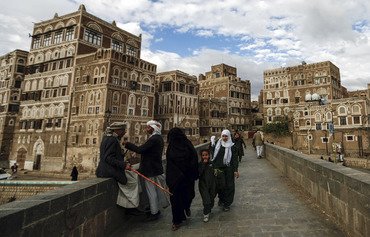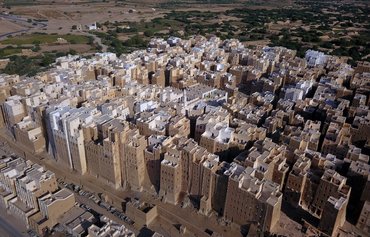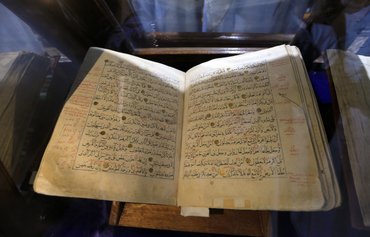ADEN -- Sanaa residents are speaking out against the Iran-backed Houthis' expropriation of 47 historic homes in Sanaa's Old City, which UNESCO classified as a World Heritage Site in 1986.
The historic properties were seized pursuant to a decree issued by Abdullah al-Kibsi, the Houthis' "Minister of Culture", said lawyer Abdul Rahman Berman.
The houses were expropriated on the grounds that they had been abandoned, he said, even though this is not the case.
"Some houses in the Old City of Sanaa were destroyed by the heavy rainfall last year, and others are subjects of dispute over ownership between heirs, which led to their neglect and abandonment," Berman said.
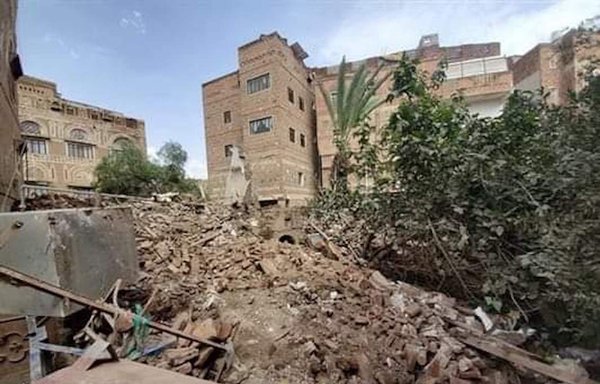
A photo circulated on social media shows a house in Sanaa's Old City that belonged to the late Yemeni poet Abdullah al-Baradouni, which collapsed following heavy rainfall in 2020. It is one of the homes seized by the Houthis.
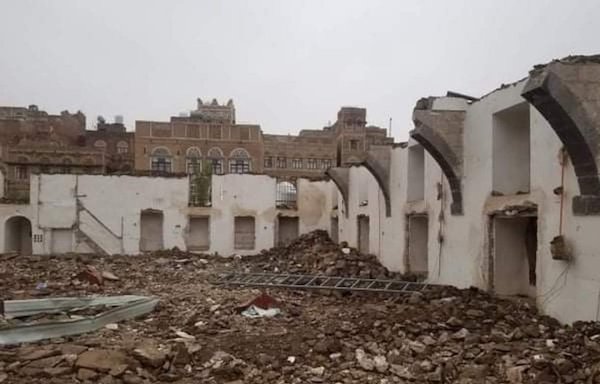
This photo that circulated on social media shows a house in Sanaa's Old City, which was destroyed in 2020 by neglect and heavy rainfall and flooding.
But "this does not give the Houthi militia the right to confiscate them, because they are private properties", he added, describing the seizures as "unlawful".
One of the properties in question belonged to the late Yemeni poet Abdullah al-Baradouni, he said, and was caught up in "a dispute between the heirs".
Other homeowners had been unable to cover the cost of maintenance or repairs in accordance with the requirements of the General Authority for the Preservation of Historic Cities in Yemen (GOPHCY) and UNESCO, he said.
"The GOPHCY, which is under the Houthis' control, did not fulfill its duties in maintaining these houses," Berman said.
He accused the Houthis of "attempting to change the distinctive architectural and cultural character of Old Sanaa by spraying slogans on its walls and modifying a number of its gates".
The group also demolished al-Nahrain mosque in Old Sanaa, which dates back to the dawn of Islam, Berman said, because they said it had not been built facing the qiblah (the direction that Muslims face in ritual prayer, toward Mecca).
Al-Baradouni's house "is among the houses confiscated by the Houthi militia because it was neglected by his heirs, and because of the dispute among them over its ownership", he said. "But this does not give them the right to seize it."
The Houthi-controlled GOPHCY rushed to deny these reports, and said it is in the process of restoring the poet's house and turning it into a museum and library.
'Owners are powerless'
According to Issam Ahmed, a resident of Sanaa's Old City, the Houthis set out to seize these destroyed and abandoned houses "because their owners are powerless and could not object".
"Some abandoned their homes in the city of Sanaa because of the cracks that developed in those houses as a result of the heavy rains last year, fearing for their lives, and these families are now without shelter," he said.
The Houthis aim "to tamper with the identity of Yemeni civilisation, and not only in Sanaa's Old City", a social activist who works for a civil organisation that protects heritage sites told Al-Mashareq, on condition of anonymity.
Maintenance work on the houses, which was carried out by local organisations with aid from the World Heritage Fund, "was halted because of the war, and this will result in damage to a large number of houses in Sanaa", the activist said.
In August 2020, the Yemeni government appealed to UNESCO to protect the country's world heritage sites as a matter of urgency against the damage caused by heavy rain and flooding.
These include Sanaa's Old City, Zabid in al-Hodeidah province and Shibam in Hadramaut.
Economist Abdulaziz Thabet accused the Houthis of attempting to change the cultural character and landmarks of Yemen's World Heritage sites for ideological and economic reasons.
About 5,000 houses have damaged roofs and require maintenance that UNESCO used to carry out, he said, noting that 100 houses were destroyed in direct shelling or during heavy rainfalls and require urgent intervention.

![Children walk through a flooded street following heavy rainfall in the old city of Yemen's capital Sanaa on August 3. [Mohammed Huwais/AFP]](/cnmi_am/images/2021/11/10/32561-old-sanaa-flood-600_384.jpg)
